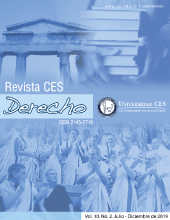The randomness in the condition of victims and / or perpetrators of childhood and adolescence in the Colombian armed conflict
DOI:
https://doi.org/10.21615/cesder.10.2.2Abstract
The dual victim-victimizer quality that has been attributed to adolescence linked to the Colombian armed conflict, is built on the fallacy of randomness, in which criterias such as the age and the crimes magnitude committed are fundamental in the criminological politics of the Colombian State, factors that we consider, given the specificities in which the recruitment is presented, as external to its volitional spectra.
In this sense, it is necessary to ask ourselves whether the attribution of a punitive type of responsibility is in accordance with the principles of the best interests of the child and progressive capacity, or if this would imply a secondary victimization from the institutional framework, generating the need to have a system that although seeks to safeguard as much as possible the rights to the truth, justice and reparation of third victims, also satisfies the rights of children and adolescents linked to the Colombian armed conflict.
Keywords: Childhood and adolescence linked to the Colombian´s armed conflict, best interests of the child, Progressive ability.
Downloads
References
Alvis, A., Duque, C.P., & Rodríguez, A. (2013). Entre la progresión y la regresión: la configuración iden-titaria en los procesos de pérdida. Revista Ces Psicología, 6(2), 177-194. http://revistas.ces.edu.co/index.php/psicologia/article/view/2602
Andersen, T. (1987). The reflecting team. Dialogue and meta-dialogue in clinical work. Family Process 26, 415-428. https://doi.org/10.1111/j.1545-5300.1987.00415.x
Arias, A.M., & Alvarado, S.V. (2015). Investigación narrativa: apuesta metodológica para la construc-ción social de conocimientos científicos. Revista CES Psicología, 8(2), 171-181. http://revistas.ces.edu.co/index.php/psicologia/article/view/3022
Arfuch, L. (2002). El espacio biográfico: dilemas de la subjetividad contemporánea. Buenos Aires: Fon-do de Cultura Económica.
Badiou, A. (2003). El ser y el acontecimiento. Buenos Aires: Manantial.
Bajtín, M. (1989). Teoría y estética de la novela. Trabajos de investigación. Madrid: Taurus.
Bajtín, M. (2003). Problemas de la poética de Dostoievski. México: Fondo de Cultura Económica.
Bateson, G. (2002). Espíritu y naturaleza. Buenos Aires: Amorrortu.
Benjamin, J. (2004). Beyond doer and done to: an intersubjective view of thirdness. The Psychoanalytic Quarterly 73, 5-46. https://doi.org/10.1002/j.2167-4086.2004.tb00151.x
Benjamin, J. (2012). El tercero. Reconocimiento. Clínica e Investigación Relacional 6 (12), 169-179. https://www.psicoterapiarelacional.es/CeIRREVISTA-On-line/CeIR-Valore-y-comente-los-trabajos-publicados/ID/299/El-Tercero-Reconocimiento-Jessica-Benjamin-PH-D
Bertrando, P., & Toffaneti, D. (2004). Historia de la terapia familiar. Barcelona: Ediciones Paidós Ibérica.
Bertrando, P. (2011) El terapeuta dialógico. El diálogo que conmueve y que transforma. México: Edito-rial Pax México.
Boscolo, L., & Bertrando, P. (2008). Terapia sistémica individual. Buenos Aires: Amorrortu.
Cornejo, M. (2006). El enfoque biográfico: Trayectorias, desarrollos teóricos y perspectivas. Psykhe, 15 (1), 95-106. https://doi.org/10.4067/S0718-222820060001000326
Cornejo, M., Besoain, C., & Mendoza, F. (2011). Desafíos en la generación de conocimiento en la inves-tigación social cualitativa contemporánea. Forum Qualitative Sozialforschung / Forum: Qualita-tive Social Research, 12(1), Art. 9. http://dx.doi.org/10.17169/fqs-12.1.1527
Cornejo, M., Faúndez, X., & Besoain, C. (2017). El análisis de datos en enfoques biográfico-narrativos: desde los métodos hacia una intencionalidad analítica. Forum Qualitative Sozialforschung / Fo-rum: Qualitative Social Research, 18(1), Art. 16. DOI: http://dx.doi.org/10.17169/fqs-18.1.2491
Creswell, J.W. (2007). Qualitative inquiry and research design: Choosing among five approaches (2nd ed.). Thousnd Oaks, CA: Sage.
da Rosa Silva, M., Duarte de Barcellos, E., Fração Sanchez, L., Steibel, D., de Paula Fernandes, P., … Pereira Klarmann, R. (2014). Registros de sessão terapêutica: relato, gravação ou transcrição? Considerações sobre as diferenças entre os registros. Psicologia Clinica, 26(2), 121-138. https://lume.ufrgs.br/handle/10183/144294
Deleuze, G. (2017). La subjetivación: curso sobre Foucault III. Buenos Aires: Cactus.
Denzin, N. (2001). The reflective interview and performative social science. Qualitative Research, 1, 23-46.
Derrida, J. (1993). Aporías. California: Stanford University Press.
Foucault, M. (1999). Obras esenciales. Volumen III: Estética, ética y hermenéutica. Barcelona: Paidós.
Foucault, M. (2012). Historia de la sexualidad I. La voluntad de saber. Madrid: Biblioteca Nueva.
Frank, A. (2001). Can we research suffering? Qualitative Health Research, 11(3), 353-362. https://doi.org/10.1177/104973201129119154
Frank, A. (2005). What is dialogical research and why should we do it. Qualitative Health Research, 15 (7), 964-974. https://doi.org/10.1177/1049732305279078
Haye, A. Larrain, A. (2010). What is an utterance? En E. Aveling, I. Kadianaki, M. Märtsin, B. Tyler, B. Wagoner, & L. Whittaker (Eds.) Dialogical Science: The Self in Communication, culture and so-ciety. London: Nova Science Publishers.
Heidegger, M. (1994). Conferencias y artículos. Barcelona: Ediciones del Serbal.
Kawulich, B. (2005). La observación participante como método de recolección de datos. Forum Qualita-tive Sozialforschung / Forum: Qualitative Social Research [On-line Journal], 6(2), Art. 43. http://dx.doi.org/10.17169/fqs-6.2.466
Lévinas, E. (2001a). Ensayos para pensar en otros. Pretextos: Valencia.
Lévinas, E. (2001b) La huella del otro. México: Taurus.
Marková, I. (2003). Constitution of the self: intersubjetivity and dialogicality. Culture & Psychology, 9 (3), 249-259. https://doi.org/10.1177/1354067X030093006
Morales, R. (2010). Psicoterapia sistémica, micropolítica y subjetividad: alcances en torno a la formación. En F. Gálvez (Comp.), Formación en y para una Psicología Clínica (45-68). Santiago: Ediciones Universidad de Chile.
Nancy. J. (2003). El sentido del mundo. Buenos Aires: La marca editora
Orange, D. (2013). El desconocido que sufre. Hermenéutica para la práctica clínica cotidiana. Santiago: Editorial Cuatro Vientos.
Pakman, M. (2010). Palabras que permanecen, palabras por venir. Micropolítica y poética en psicotera-pia. Barcelona: Gedisa.
Pakman, M. (2014). Texturas de la imaginación. Más allá de la biología y el giro lingüístico. Barcelona: Gedisa.
Rober, P. (1999). The therapist’s inner conversation in family therapy practice: some ideas about the self of the therapist, therapeutic impasse, and the process of reflection. Family Process, 38, 209-228. https://doi.org/10.1111/j.1545-5300.1999.00209.x
Valsiner, J. (2002). Forms of dialogical relations and semiotic autoregulations within the self. Theory & Psychology, 12 (2), 251-265. http://dx.doi.org/10.1177/0959354302012002633
White, M. (2002) Reescribir la vida. Entrevistas y ensayos. Barcelona: Gedisa.
White, M., & Epston, D. (1993) Medios narrativos para fines terapéuticos. Barcelona: Paidós.
Downloads
Published
How to Cite
Issue
Section
License
Copyright (c) 2019 CES Derecho

This work is licensed under a Creative Commons Attribution-NonCommercial-ShareAlike 4.0 International License.
| Article metrics | |
|---|---|
| Abstract views | |
| Galley vies | |
| PDF Views | |
| HTML views | |
| Other views | |




